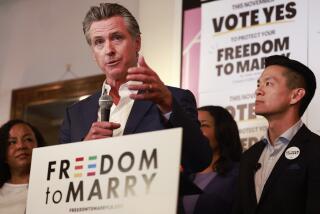Put Meaning Back Into Campaigns : Both Fun and Purpose Seem Missing From Politics Today
Pollster: “Do you agree that the two biggest problems facing California politics are ignorance and apathy?”
California voter: “I don’t know and I don’t care.”
We’re just weeks away from California’s primary election, yet no one seems to be enjoying the campaign.
It would be easy to blame this year’s cast of characters. But somehow I think it’s not their fault. We just seem to have gotten to a point where statewide political campaigns are no longer satisfying to anybody. They don’t seem real and they certainly don’t involve everyday people.
At the heart of the problem is the fact that politics just is not all that important to most Californians. Our lives are so overloaded today with long commutes, big house payments and complicated family arrangements that most people don’t have room for politics. So we leave government to the professionals.
And the fact is, we get a pretty good deal. California government, at all levels, is generally so clean and efficient and dominated by civil service employees that it doesn’t seem to make much difference who’s in elective office. For instance, as different as Gov. George Deukmejian is from his predecessor, Edmund G. Brown Jr., the change in administrations has not caused a detectable change in the typical Californian’s life--other than the fact that television coverage of state government is less entertaining. I’m not saying elections don’t make a difference. I’m saying the average person doesn’t feel the difference.
As a result, candidates have a real challenge trying to get folks interested in their campaigns. It’s like being the comic that goes on before the striptease show. Not only are the fans not interested, they resent you taking up their time when they’ve got more meaningful things on their minds. This is why some candidates resort to publicity stunts and cheap-shot attacks. They’re afraid that otherwise, the press and public won’t notice them.
But this is not entirely new. Apathy has been around for some time and people have always groused about politics. What is new is that the people who love politics the most are the ones complaining the loudest about how lousy things have become. The political “junkies” used to have a great time--working campaigns, rubbing elbows with the hotshots and feeling that they were involved in something worthwhile. These last few years, however, you can tell that the thrill is gone. Even the politicians are warning that campaigns are too long, too expensive, too artificial and too nasty.
The candidates hate having to raise all that money. The contributors are tired of being hit up all the time (one major donor told me why he had to stop contributing: “I didn’t run out of money--I ran out of checks”). The press resents having to cover staged media events. And the party activists feel left out.
Perhaps the most frequently heard criticism is that campaigns are too expensive--so much so that money seems to drive everything else in politics. The single most important element of a candidate’s viability today is his or her ability to raise funds. You can figure that a nominee for governor or U.S. Senate needs to raise a million bucks a month between now and November (about $30,000 per day). Campaigning today means raising money, hiring consultants, raising money, hopping from “press hit” to “press hit,” and raising money. At some point in the process, the consultants produce ads based on the polls and put them on the tube--this is the part of the campaign that the public sees.
You would think that all this would cause citizens to become cynical. But the irony is that it is the insiders, and not the general public, who are calling for reform. The high cost of campaigns and the concomitant control of politics by moneyed special interests don’t seem to bother the average voters all that much. In the coffee shops in Fresno, to the extent that these average voters are talking about politics at all, it’s about terrorism, oil prices and the new mayor of Carmel. The high cost of campaigning is not one of the things they’re losing sleep over. In fact the solution--public financing of campaigns--bothers them more than the problem. “I don’t want my tax money going to those bimbos . . . let them raise it themselves!”
I can’t prove it, but my sense is that politics is becoming less important to a large number of people and more important to a small number--and neither group likes the way the process is working.
For those who have long been involved in politics, the question is: When are we going to start having fun again? But the more important question that must be asked is whether democracy can long survive in a society that ignores, or even detests, politics.
More to Read
Get the L.A. Times Politics newsletter
Deeply reported insights into legislation, politics and policy from Sacramento, Washington and beyond. In your inbox three times per week.
You may occasionally receive promotional content from the Los Angeles Times.










